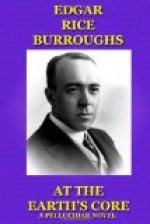“You little sinner!” I exclaimed. “And you have caused me all this anguish for nothing!”
“I have suffered even more,” she answered simply, “for I thought that you did not love me, and I was helpless. I couldn’t come to you and demand that my love be returned, as you have just come to me. Just now when you went away hope went with you. I was wretched, terrified, miserable, and my heart was breaking. I wept, and I have not done that before since my mother died,” and now I saw that there was the moisture of tears about her eyes. It was near to making me cry myself when I thought of all that poor child had been through. Motherless and unprotected; hunted across a savage, primeval world by that hideous brute of a man; exposed to the attacks of the countless fearsome denizens of its mountains, its plains, and its jungles—it was a miracle that she had survived it all.
To me it was a revelation of the things my early forebears must have endured that the human race of the outer crust might survive. It made me very proud to think that I had won the love of such a woman. Of course she couldn’t read or write; there was nothing cultured or refined about her as you judge culture and refinement; but she was the essence of all that is best in woman, for she was good, and brave, and noble, and virtuous. And she was all these things in spite of the fact that their observance entailed suffering and danger and possible death.
How much easier it would have been to have gone to Jubal in the first place! She would have been his lawful mate. She would have been queen in her own land—and it meant just as much to the cave woman to be a queen in the Stone Age as it does to the woman of today to be a queen now; it’s all comparative glory any way you look at it, and if there were only half-naked savages on the outer crust today, you’d find that it would be considerable glory to be the wife a Dahomey chief.
I couldn’t help but compare Dian’s action with that of a splendid young woman I had known in New York—I mean splendid to look at and to talk to. She had been head over heels in love with a chum of mine—a clean, manly chap—but she had married a broken-down, disreputable old debauchee because he was a count in some dinky little European principality that was not even accorded a distinctive color by Rand McNally.
Yes, I was mighty proud of Dian.
After a time we decided to set out for Sari, as I was anxious to see Perry, and to know that all was right with him. I had told Dian about our plan of emancipating the human race of Pellucidar, and she was fairly wild over it. She said that if Dacor, her brother, would only return he could easily be king of Amoz, and that then he and Ghak could form an alliance. That would give us a flying start, for the Sarians and the Amozites were both very powerful tribes. Once they had been armed with swords, and bows and arrows, and trained in their use we were confident that they could overcome any tribe that seemed disinclined to join the great army of federated states with which we were planning to march upon the Mahars.




